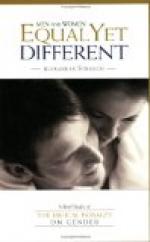What was Scripture usage? From Exodus xv, 20, we learn that Miriam was a prophetess, and, in the verse following, it appears that not only she, but the women of her company, took a prominent part in the celebration of Israel’s triumphant passage of the Red Sea. Not only was Miriam a prophetess, but a joint leader with Moses and Aaron of that great host which went up to possess the promised land, as is seen by reference to Micah vi, 4: “For I brought thee up out of the land of Egypt, and redeemed thee out of the land of servants, and I sent before thee Moses, Aaron, and Miriam.” Thus did God, in the very beginning of the Jewish Church and nation, associate a woman with men, giving her an equally responsible position with her brothers. Moses was the lawgiver, Aaron the priest, and Miriam the seer. This threefold office was fulfilled in Christ; and therefore Miriam, as well as Moses and Aaron, was a type of the Messiah.
If the Almighty had not designed women to occupy prominent positions, both civilly and ecclesiastically, he certainly would not have qualified them to fill such places with honor; and history proves that he did both qualify and employ them. Deborah was both a prophetess and a judge, and at one time was the chief ruler in Israel, even leading on the hosts of the living God; for timorous Barak would not go without her. Huldah, wife of Shallum, a prophetess who flourished in the reign of Josiah, was consulted by him on matters of vital importance to his kingdom, although both Jeremiah and Zephaniah were then alive. Josiah evidently considered her fully equal to either of them, or he would not have consulted her, or at her dictation set about reforming the abuses which were prevalent at the time. He could not have set to work more earnestly in this good cause if Jeremiah had spoken to him. There have been learned men—and there are those still—who think it exceedingly strange that Josiah should have condescended to send the messengers to Huldah to inquire of the Lord, when he might have consulted either Jeremiah or one of the brother prophets. Is it not equally strange that the Lord should have answered him by her mouth? or rather should not his having done so, forever silence such questioning?
Other women have been emphatically the “called,” according to “God’s purpose,” to combat evil in countries even where women were treated with greater indignities than in Israel. We do not make any distinction between prophets and prophetesses. Men and women were alike called to the prophetic office, as God pleased, and kings and princes acknowledged their authority. Many women became noted for their active service rendered to the Jewish Church and nation.
Women have proved themselves to be skillful diplomatists, and to be possessed of an equal amount of courage and perseverance with men; but these capabilities have not always been employed aright. There have been distinguished statesmen who have been frightfully wicked men; and, unhappily, there have been clever women who have been fully their equals in wickedness. In nothing is the mental equality of women with men more clearly indicated than in the manner in which both pursue a career of sin.




